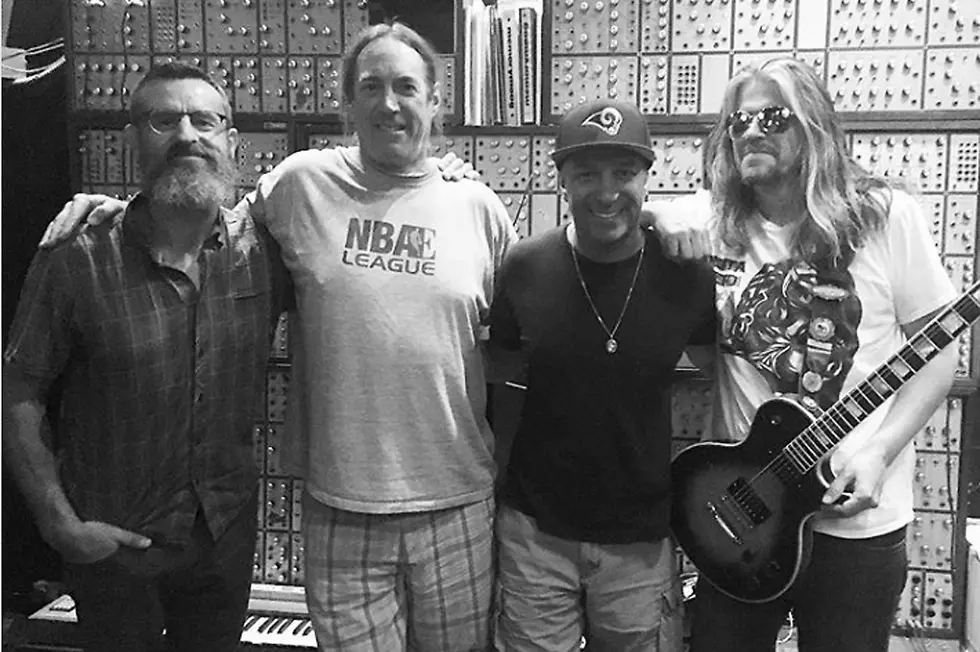
15 Years Ago: Rage Against the Machine Make Their Own Mixtape With ‘Renegades’
Cover albums are usually afterthoughts in a band's catalog, but Rage Against the Machine's Renegades has a few things going for it that make it intrinsic to the band's identity. It's their last studio album, for one – their farewell gift to their rabid fan base. It was also produced by the great Rick Rubin, who worked wonders with Johnny Cash on his "American Recordings" series, so there's another. Inevitably, though, there's only one reason that truly matters: Renegades is a great album.
Covering other artists' songs can be a tricky business. The space separating "you made it your own, dawg" and "that isn't even the same song anymore" is ill-defined, yet simply playing the song as written is certain suicide. Faithful reproductions of the original material comes off as unimaginative at best and karaoke at worst. An artist covering Bob Dylan, for example, must honor the original while revealing something new about the song. A truly successful cover can transcend the original: Jimi Hendrix's "All Along the Watchtower," for example, is so definitive that even Dylan plays it like a Hendrix song.
Renegades succeeds in a manner similar to Hendrix's classic Dylan cover. From the front sleeve, which co-opts Robert Indiana's ubiquitous "Love" image, through Dylan's "Maggie's Farm," the album's closing track, Rage made it their own while leaving enough space for the source material to shine through -- most of the time.
At first listen, some cuts seem to be so Rage-ified as to no longer resemble the originals, but the connection is there. Afrika Bambaataa's "Renegades of Funk" remains a dance track, but updated from its pop-and-lock '83 roots to a millennial mosh pit. "Microphone Fiend" sounds precisely like an RATM song, but lurking under the covers is Rakim's smooth flow and Eric B.'s turntables, recreated here by Tom Morello's ostinato guitar riff. The lesson is clear: If you missed Eric B. & Rakim back in '88, it was probably because your musical bias was clogging your ears.
That's perhaps Renegades' greatest gift to its listeners. Rage stood behind a powerful bully pulpit thanks to their huge audience, and they used it to great effect. More than a collection of favorite songs, the album feels almost like a required listening list: Like punk? Check out MC5 and the Stooges. Think the only two influential bands to break in '91 were Nirvana and Pearl Jam? Check out Cypress Hill's "How I Could Just Kill a Man."
The latter was one of the album's three singles, joining "Renegades of Funk" and a completely unrecognizable version of Bruce Springsteen's "The Ghost of Tom Joad." Where complete transformation might be considered a liability (why remake a song if you're just going to turn it into a new song?) in the case of "Joad" and Dylan's "Maggie's Farm," Rage-ifying the cuts demonstrated an uninterrupted continuum of protest music connecting the '60s folkies to hip hop. "Highway patrol choppers comin' up over the ridge" -- Springsteen or Rakim? Exactly.
As Hendrix's "Watchtower" was to Dylan, Rage's take on "Joad" found its way back to the Boss, sort of. Morello joined Springsteen at the 2009 Rock and Roll Hall of Fame ceremony for a mashup of the two versions.
Renegades also reminded us that some long tamed and de-fanged bands used to be feral beasts. They didn't come much more dangerous in the late '60s and early '70s than the MC5, the Stooges and the Rolling Stones. Rage's take on the latter's "Street Fighting Man" restores the anger and urgency that decades of costume changes and private jets had long worn off. As for the MC5's "Kick Out the Jams"? Well, honestly, there's no way to jam any more rage into the original. Covering that track is like saddling up an angry bull: the best any band can do is hang on and try to ride out the clock. Rage Against the Machine survive the ride just fine, but arguably it's the straightest cover on the album.
The least successful track on the album is Devo's "Beautiful World." The 1981 original juxtaposed a cheerful melody against an ambiguous sentiment: "It's a beautiful world, for you." Is the speaker celebrating the "beautiful people everywhere" in the song's "sweet romantic place"? Presumably so, and so the listener is lulled into this warm, perfect world only to have the rug yanked away in the song's closing lines: "It's a beautiful world for you, not me."
But Rage suck all of the sunny irony out of the track, recasting it as a minor key dirge devoid of any fun. Unlike "Tom Joad" and the other examples mentioned, we don't learn anything new about the song. Instead, we're left with an impression of a band that takes itself too seriously. That's a false impression, by the way: They sound like they're having a blast tearing through the Stooges' "Down on the Street" and Minor Threat's "In My Eyes."
It's worth noting that when Renegades was released, NME cited "Beautiful World" as the album's "most insidious track," reminding us that these kinds of judgements are awfully subjective. One person's throwaway track is the soundtrack to somebody else's life, after all. And thanks to Rage Against the Machine, more than a million buyers had the opportunity to add a dozen classic songs that they may have never heard otherwise to their personal soundtracks. As farewell gifts to fans go, that's a pretty damned good one.
20 Artists Keeping Rage Against the Machine's Spirit Alive
More From Diffuser.fm









